The Only Local SEO Checklist You’ll Ever Need
The Only Local SEO Checklist You’ll Ever Need
The need for a robust local SEO strategy continues to grow. In the past five years, ‘near me’ related searches on Google have increased by 126 percent. It also pays to rank high in local search queries. Our research found that businesses ranked number one on Google earn 612 percent more traffic than those ranked 10. Therefore, it’s essential for companies — particularly multi-location businesses — to have a local SEO checklist they can refer to and leverage.
Our blog post explains the importance of local SEO and lays out a detailed local SEO checklist to ensure your business ranks well on search engine results pages (SERPs).
What is Local SEO and Why Does It Matter?
Before going further, let’s ensure we have the same definition of local SEO.
Local SEO, also called local search, is a marketing strategy that helps your local businesses appear in relevant search results on search engines like Google.
Depending on the query, search engines often bring users to the Local Finder/Pack or the local organic search results.
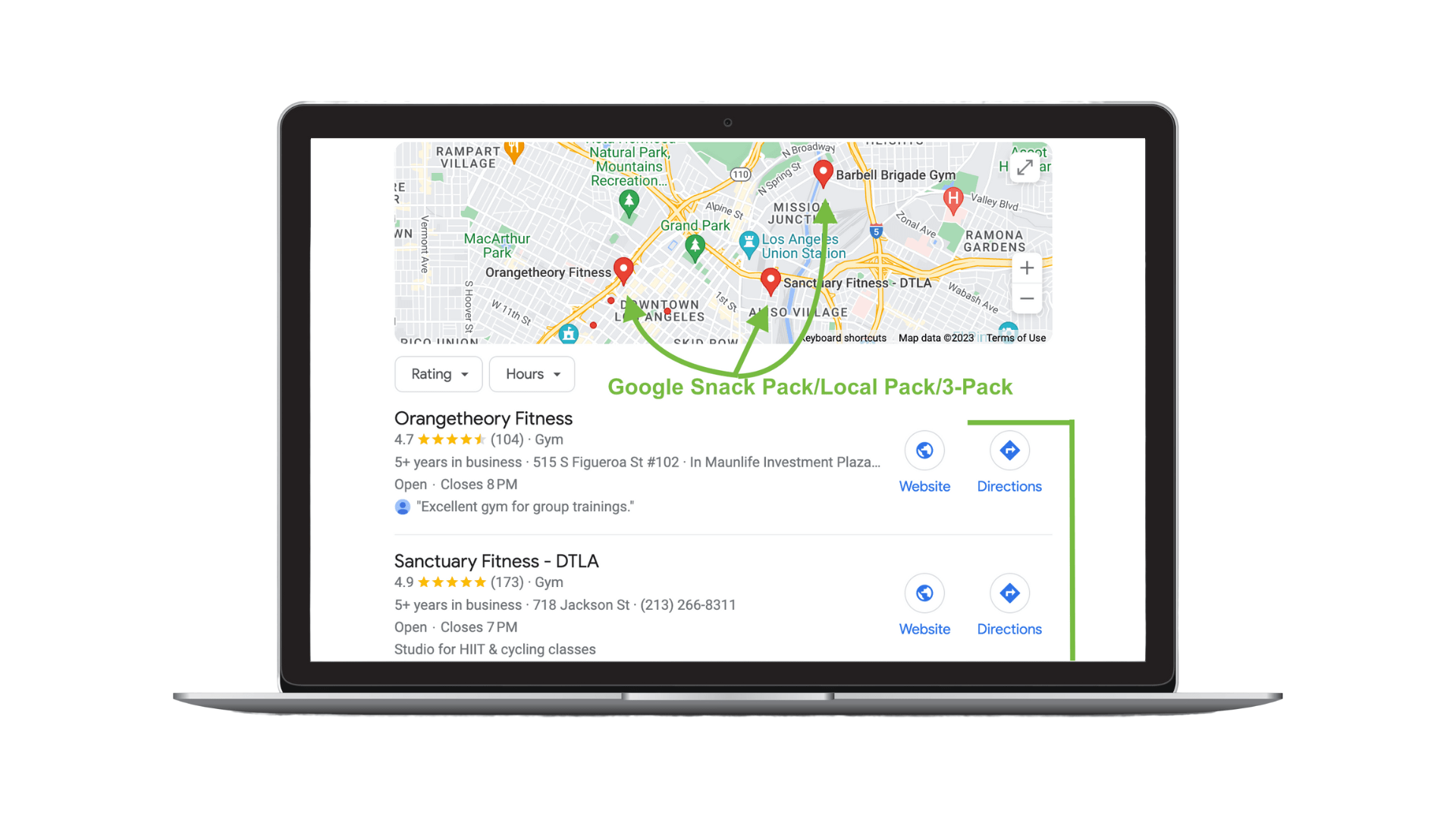
Why does appearing high in these local search results matter?
Users often click on the top-ranking businesses. The higher your ranking, the more online and in-person traffic you get.
Our Top Ranking and Conversion Factors for Local Search research report found that businesses ranking in the Google 3-Pack — also called the Local Pack — receive 126 percent more traffic and 93 percent more actions (calls, website clicks, request for driving directions) than those ranked 4-10.
The local SEO checklist below will help you achieve and maintain high local search rankings. Let’s dive in!
1. Claim and Optimize Your Local Listings
One of the first steps you should do is ensure all of your local listings are claimed and optimized on all major directories.
If you don’t already know, a local listing is an online profile of your business. They often appear on search engines and local directories like Google, Apple Maps, Yelp, Facebook, etc.
At a minimum, your local listings should include the following information:
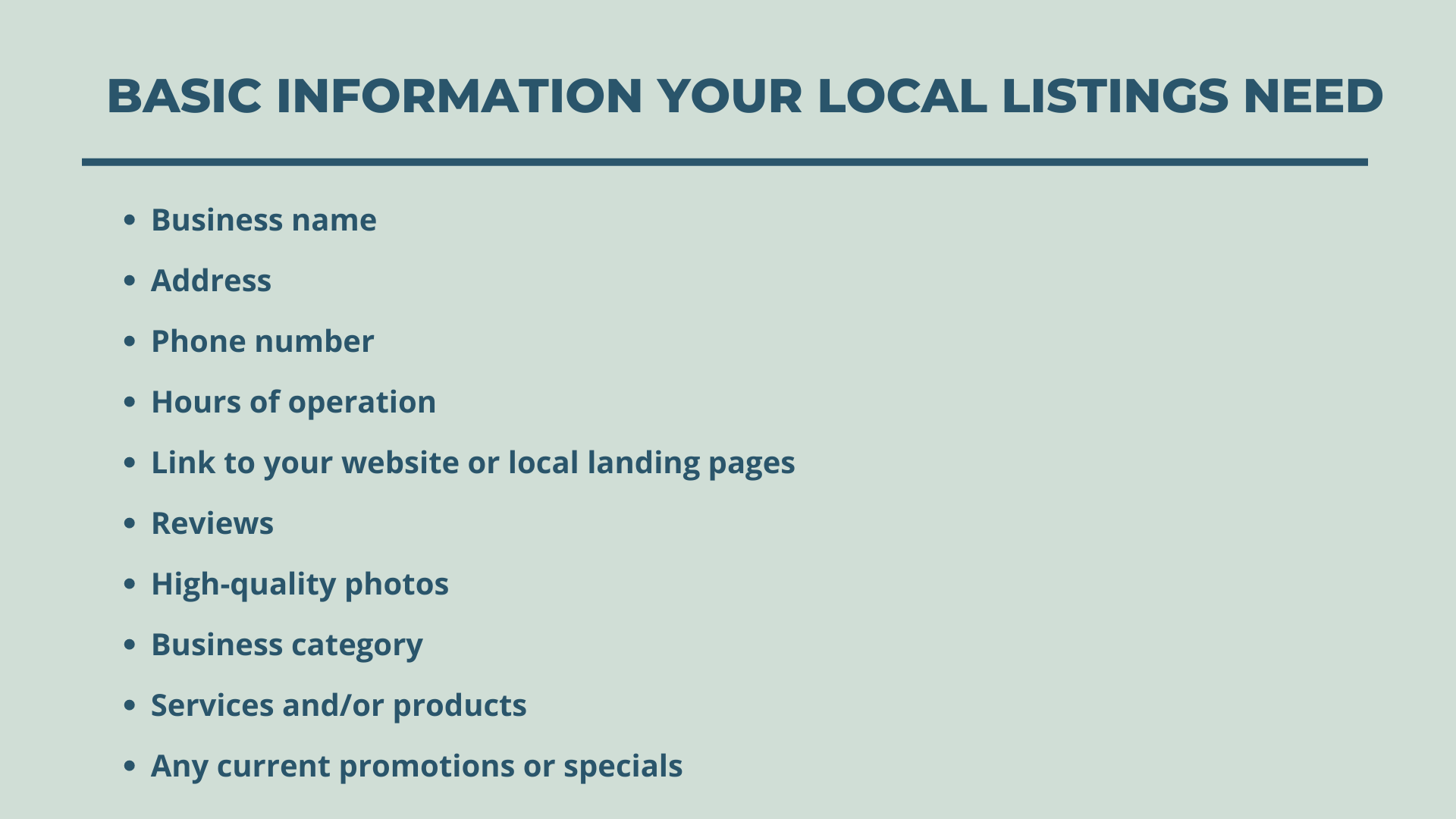
The most crucial local listing is your Google Business Profile (GBP), since Google owns nearly 93 percent of the search engine market share. Your GBPs are the first listing you should update and optimize.
Including targeted keywords is part of optimizing your GBP and other local listings, which we’ll dive into next!
2. Ensure You Use the Correct Keywords
For general SEO, marketing teams often use keyword tools like Semrush or Ahrefs to research keywords they want to target on their website.
Local SEO works similarly. You want to conduct keyword research to create a list of keywords that consumers often use to find your business and nearby competitors.
When creating your keyword list, you’ll want to consider keywords’ search volume (how often they’re searched for monthly) and ranking difficulty (how challenging it is for a site to rank for these keywords).
You also want to include location-specific and long-tail keywords in your research and list.
Location-specific keywords for a sushi restaurant in San Francisco might include “San Francisco sushi restaurant” or “best sushi in San Francisco.” You should place these throughout your website or local listing.
Long-tail keywords are more specific phrases people use when searching online. For local SEO, long-tail keywords should also be location-specific. For instance, you might try to rank for “vegan sushi in San Francisco” or “all you can eat sushi in San Francisco.”
Below is an example of relevant keywords a sushi restaurant in San Francisco can try to rank for.
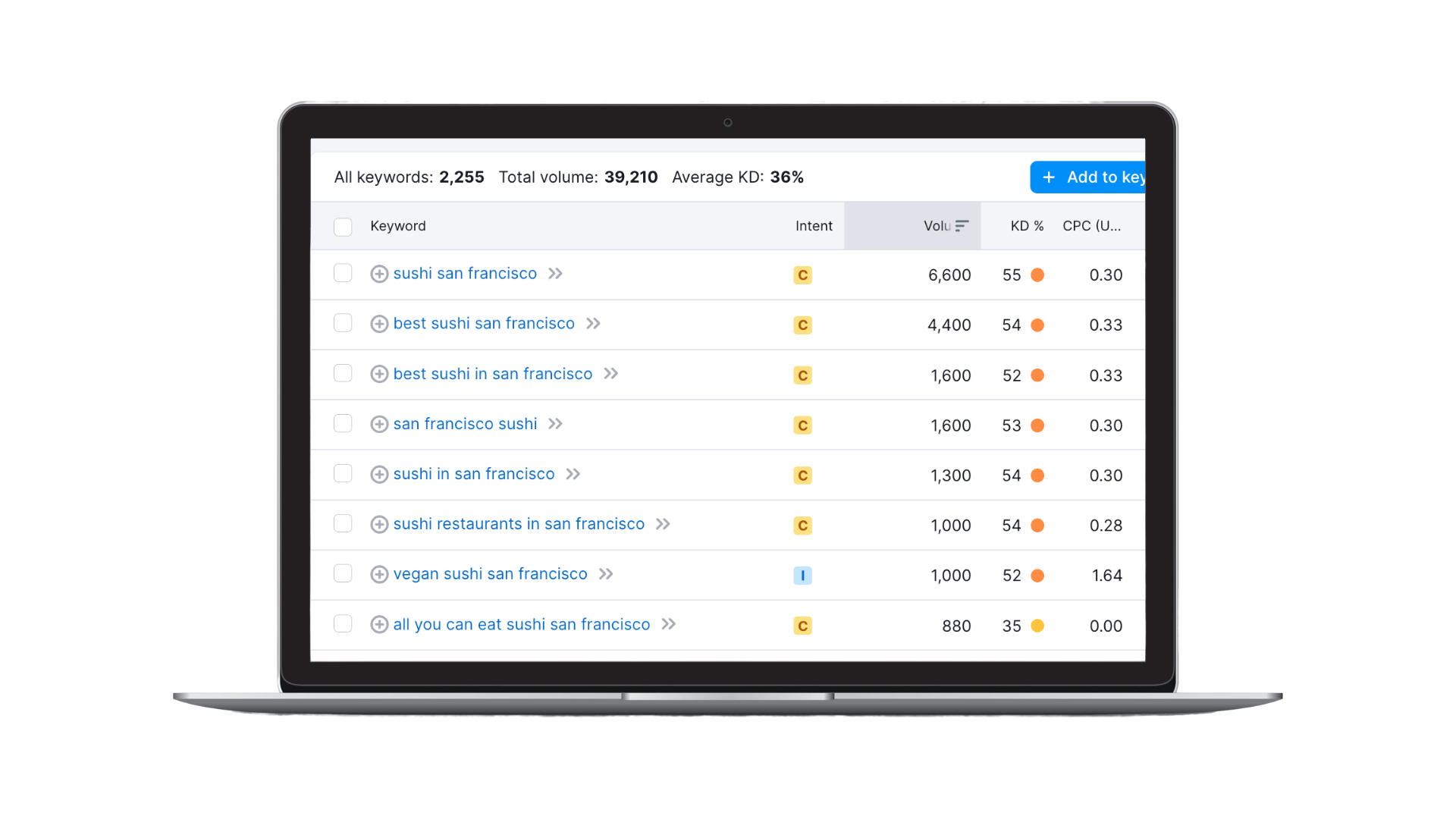
3. Optimize Your Local Pages and Store Locator
Similar to optimizing local listings, you must create and optimize your local pages. Having a store or product locator also helps with local SEO.
Local Pages
Local pages, often called local landing pages, are individual web pages on your website connected to an individual business location or franchise. They’re similar to local listings. However, because local pages live on your website, you have complete control over their branded look and what’s published.
On your local pages, you should include all the basic business information on your listings, such as name, address, and phone number (NAP) information, business hours, products, promotions, menus, etc. Here’s an example of a Nékter local landing page.
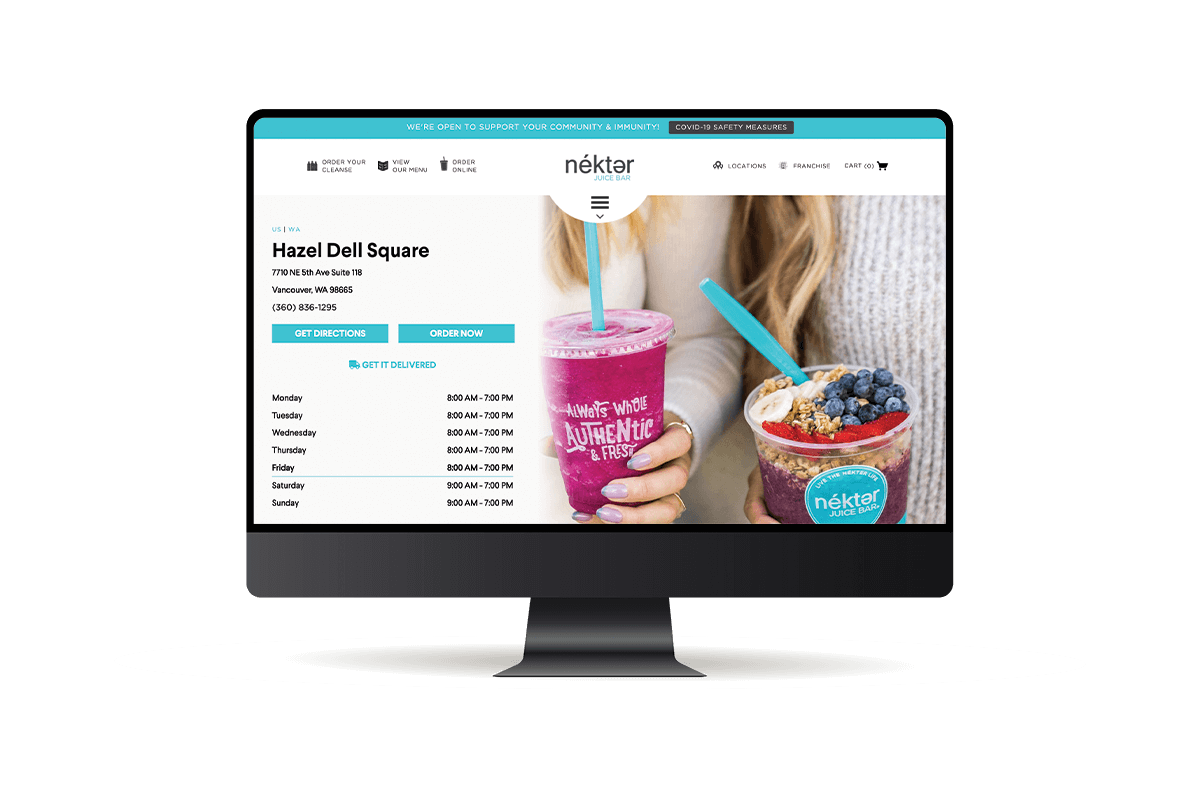
You should also include location-specific keywords and content on them. These keywords and content can help your website appear in local search results. Read our blog post on local landing pages for more details on optimizing them for SEO.
Store Locators
It’d be wrong to discuss local pages without acknowledging their relationship with store locators.
A store or product locator is a page on your website listing all your local retailers. Below is an example of a Nékter store locator.
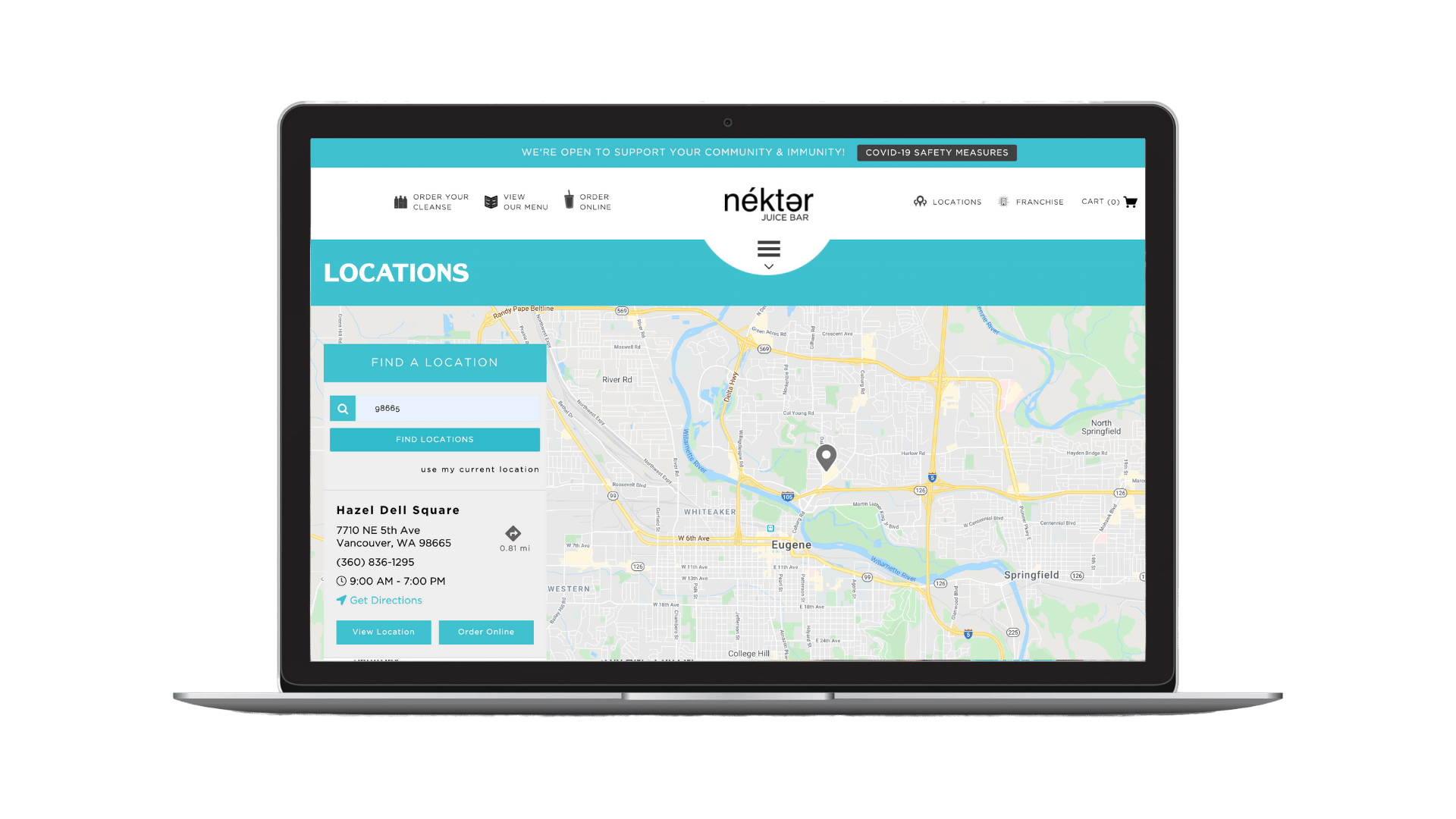
Note, if you’re a manufacturer and don’t have brick and mortar stores, you likely use a product locator, which shows local dealers that sell your products.
Like local pages, store locators help businesses provide location-specific information to customers searching for services or products.
Furthermore, store locators improve the user experience (UX) by keeping users on your website and making placing an order or requesting a service more seamless.
Having a well-customized store locator and local pages can only help your local SEO efforts and generate a better UX.
4. Solidify On-Page SEO Basics
Now that you’ve claimed and optimized your local listings, created an on-brand store locator and local pages, and added keywords to both, it’s time for some more technical on-page SEO.
On-page SEO is the process of optimizing the content and HTML source code on your website for search engines and users. For local SEO, this means updating your local pages, store locator, blogs, and more. This optimization will improve your relevance to specific search queries and help boost online visibility.
You’ll make most of these on-page SEO updates in your content management system (CMS), like WordPress.
Below are a few specific on-page optimizations you must make.
Title Tags:
A title tag is an HTML element that helps search engines identify the title of a webpage. These are often the title of the page. For instance, a blog post’s title tag would simply be the blog post’s title.
Title tags should be between 50 and 60 characters and, page-dependent, include a targeted keyword.
Meta Descriptions:
Meta descriptions appear just below title tags on search engines. Meta descriptions act as informational blurbs for what a reader will find on the page. Try to make your meta descriptions informative and enticing. It’s best practice to limit them to 50-160 characters.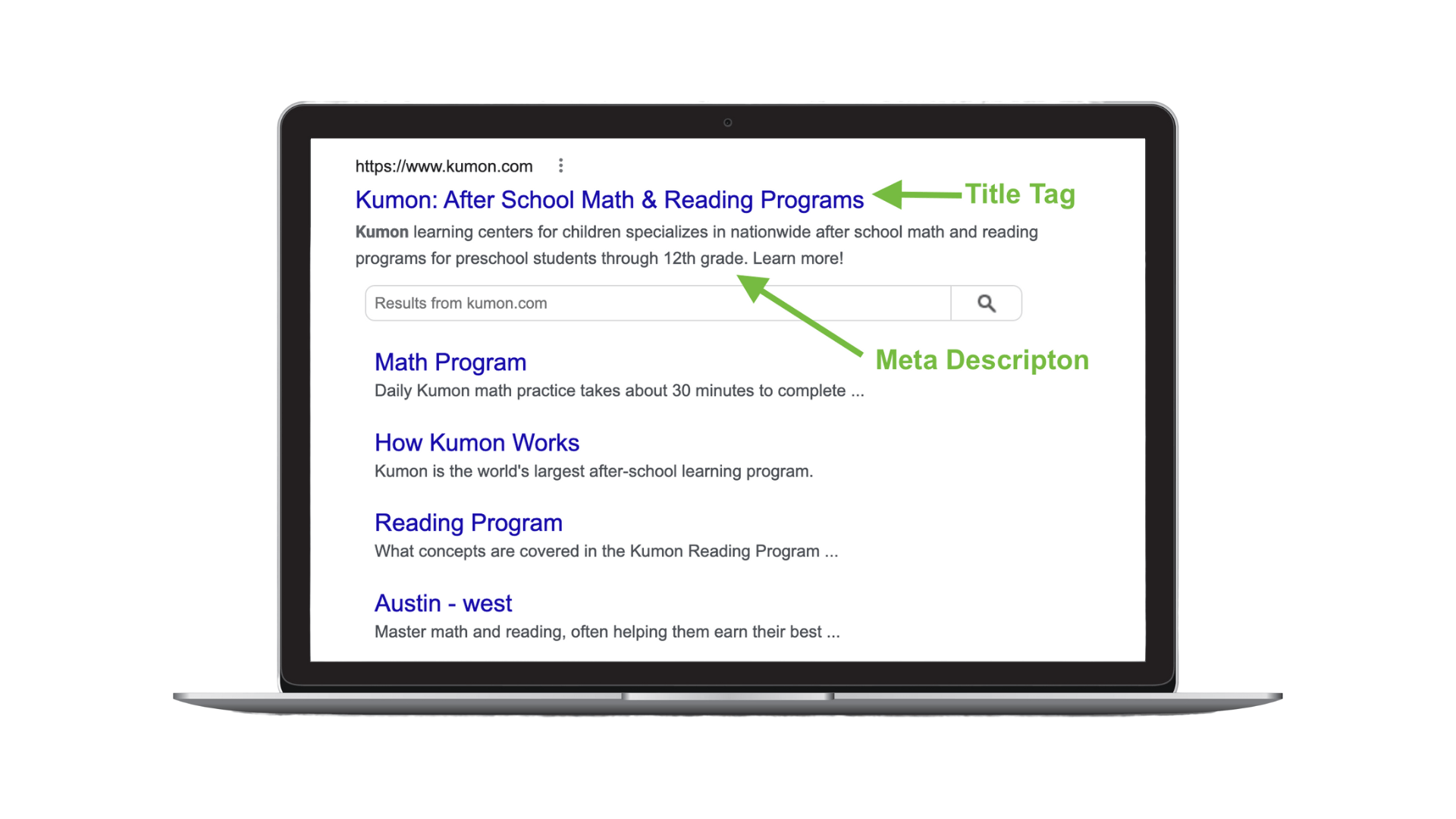
Clean URLs:
Having clean URLs is another on-page SEO tactic. Clean URLs use natural language and are easy for humans and search engines to read. Follow these URL tips:
- Use hyphens to separate words
- Include relevant keywords, especially location-specific keywords
- Only use lowercase letters
- Avoid using special characters, such as @, ?, $, %, and #
Schema Markup:
Schema markup is a form of microdata that helps search engines crawl and better understand and interpret the content on a web page.
In short, well-written schema markup can help your local businesses appear in special SERP features like answer boxes and other rich results.
For local businesses, we recommend adding the LocalBusiness structured data from Schema.org to your HTML code. You can test your code using Google and Schema.org’s Structured Data Testing Tool.
We also recommend using an SEO expert or agency when updating your schema markup.
5. Gain Ratings and Reviews
A high volume of positive ratings and reviews affects your GBP’s rankings, particularly in the Local Finder and Pack. Our research found that the highest-ranked businesses in local searches have the highest review volume. On average, GBPs ranked 1-3 have 21 percent more reviews than profiles ranked 4-10.
Ratings influence not only local search rankings but also conversions, such as calls, website clicks, request for driving directions. According to our State of Google Reviews research report, an increase in one full star on a GBP corresponds with a 44 percent increase in conversions.
Here are a few ways to encourage customers to write reviews:
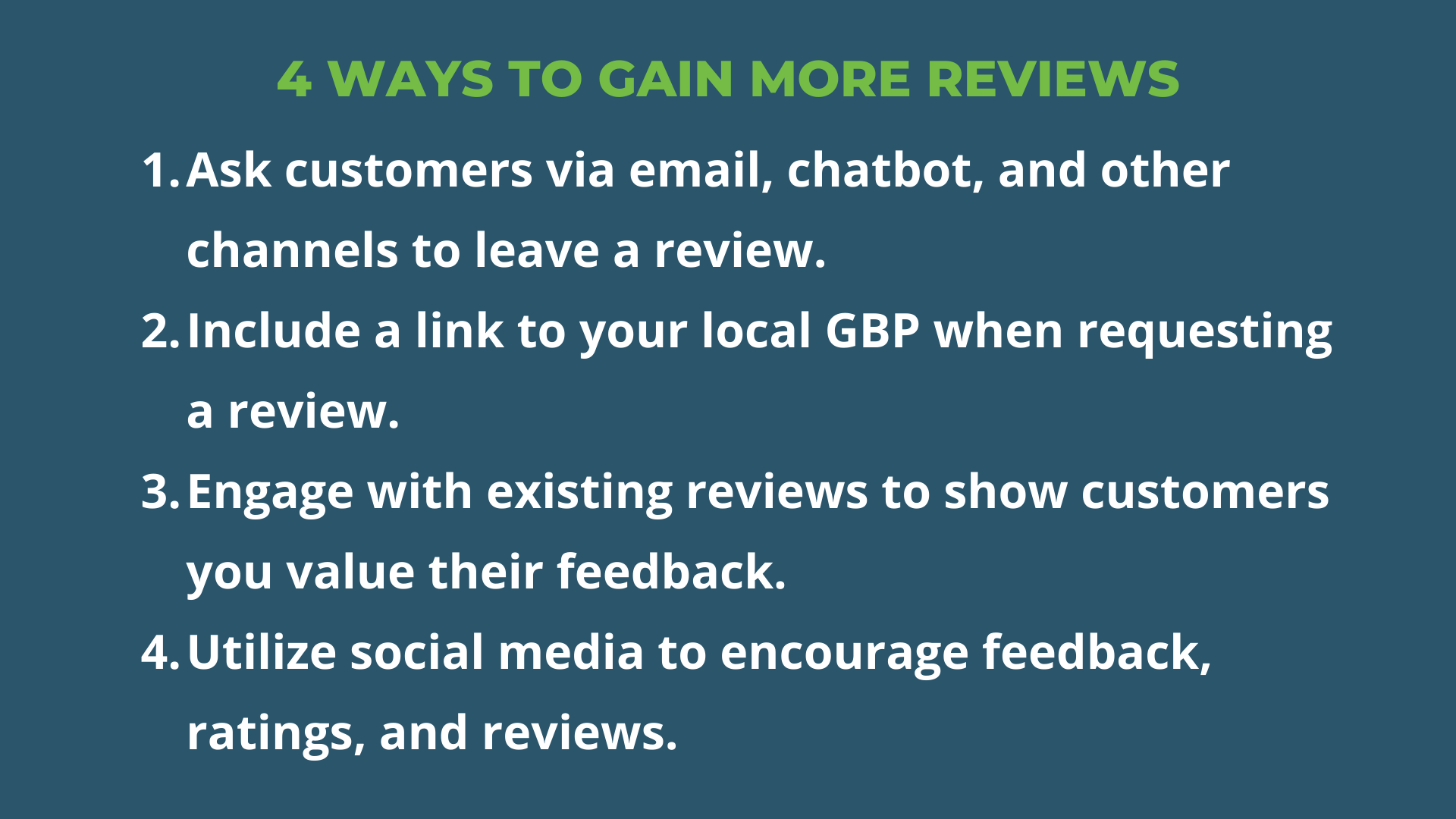
You can download our Multi-Location Marketer’s Guide to Online Reputation Management for more specific tips on how to best manage and respond to reviews.
6. Produce Local SEO Content
Part of your SEO strategy should include creating local content that can gain backlinks. Backlinks are links from other sites pointing to your website’s pages.
The best way to gain links through content is to produce unique, relevant, and intriguing content that other journalists, bloggers, and people want to cite and link to.
For example, if you’re a property management company (PMC), you might produce local neighborhood guides that other local sites will link to. Another idea is to produce proprietary real estate trends for a city or area.
If possible, it’s also best practice to make this content keyword-focused. Again, using keyword tools like Semrush or Ahrefs will help you research long-tail keywords you can create content around to try and rank for.
7. Build Local Backlinks
In the above section, we briefly mentioned that gaining backlinks is a high-value SEO tactic. We also mentioned that content marketing can help you gain natural backlinks to your website. The more well-respected backlinks your business has, the better.
Below are a few other backlink-building tactics:
- Create partnerships with local nonprofits, industry groups, and companies and co-sponsor local events with them
- Participate in guest posting in exchange for links to your website
- Contact local media outlets, journalists, and bloggers to sponsor your business or write a review
- Work with a PR or content marketing agency to gain more local brand awareness and backlinks
These backlink building tactics will help your website and pages rank better. For more detailed tactics, read our blog post, How to Improve Your Local SEO With Backlinks.
Start Improving Your Local SEO Efforts Today
To recap, here is your final local SEO checklist:
- Claim and optimize your local listings
- Ensure you use correct keywords
- Optimize your local pages and store locator
- Solidify on-page SEO basics
- Gain ratings and reviews
- Produce local SEO content
- Build local backlinks
As a reminder, one of the most important local search ranking factors is ensuring you’ve claimed and optimized all of your GBPs and other local listings. SOCi can help you achieve this task!
SOCi Listings allows you to monitor and modify your local listings on all major directories. Furthermore, SOCi GeoRank, part of SOCi Listings, gives you a geographical view of Google search keyword rankings at the local, regional, and corporate levels. With this, you can monitor and analyze you and your competitors’ local search results and keyword rankings over time.
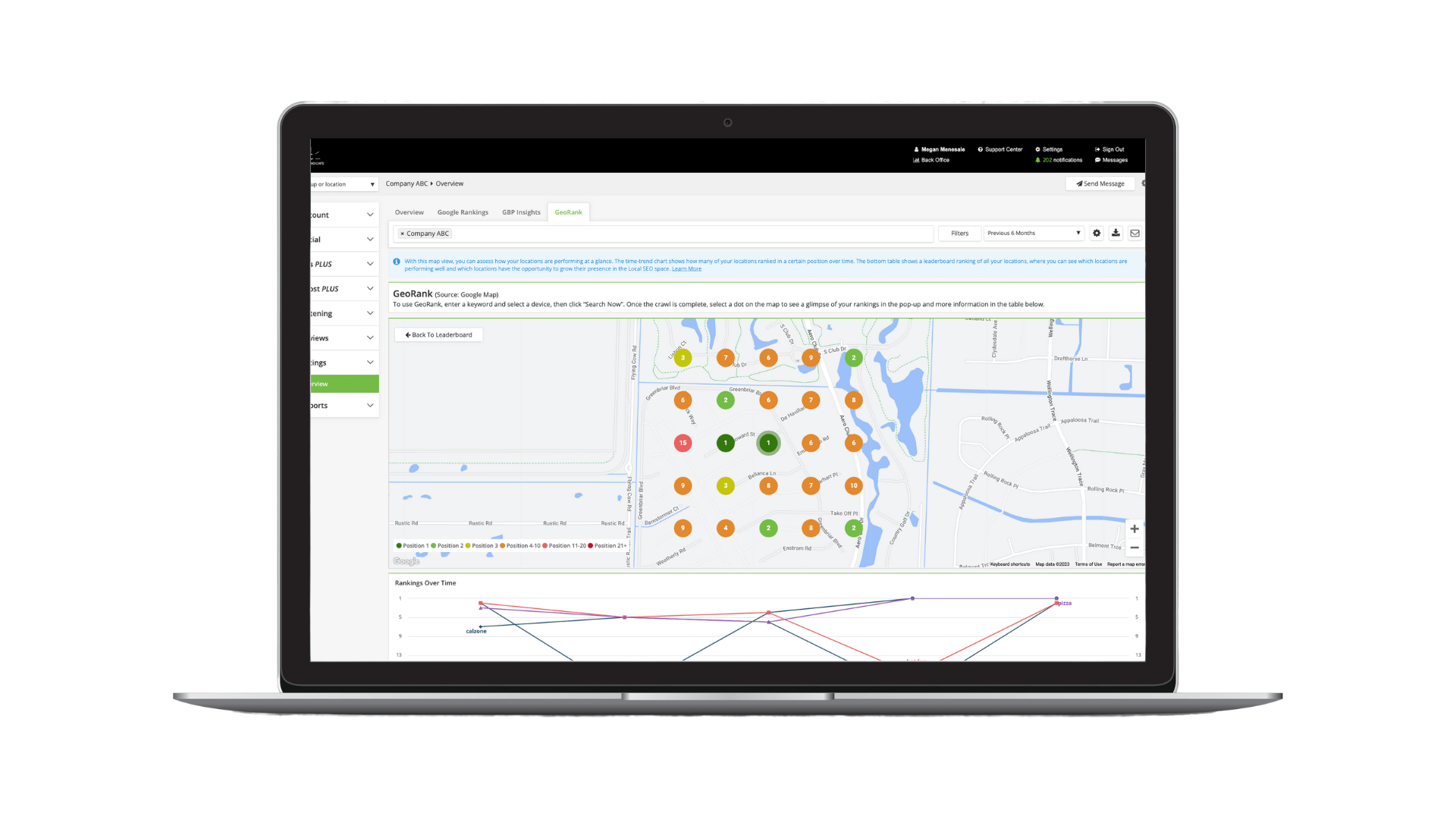
We also mentioned the impact ratings and reviews have on your business’s local search rankings and conversion rate. SOCi Reviews can help you monitor every engagement on your local listings and address them promptly.
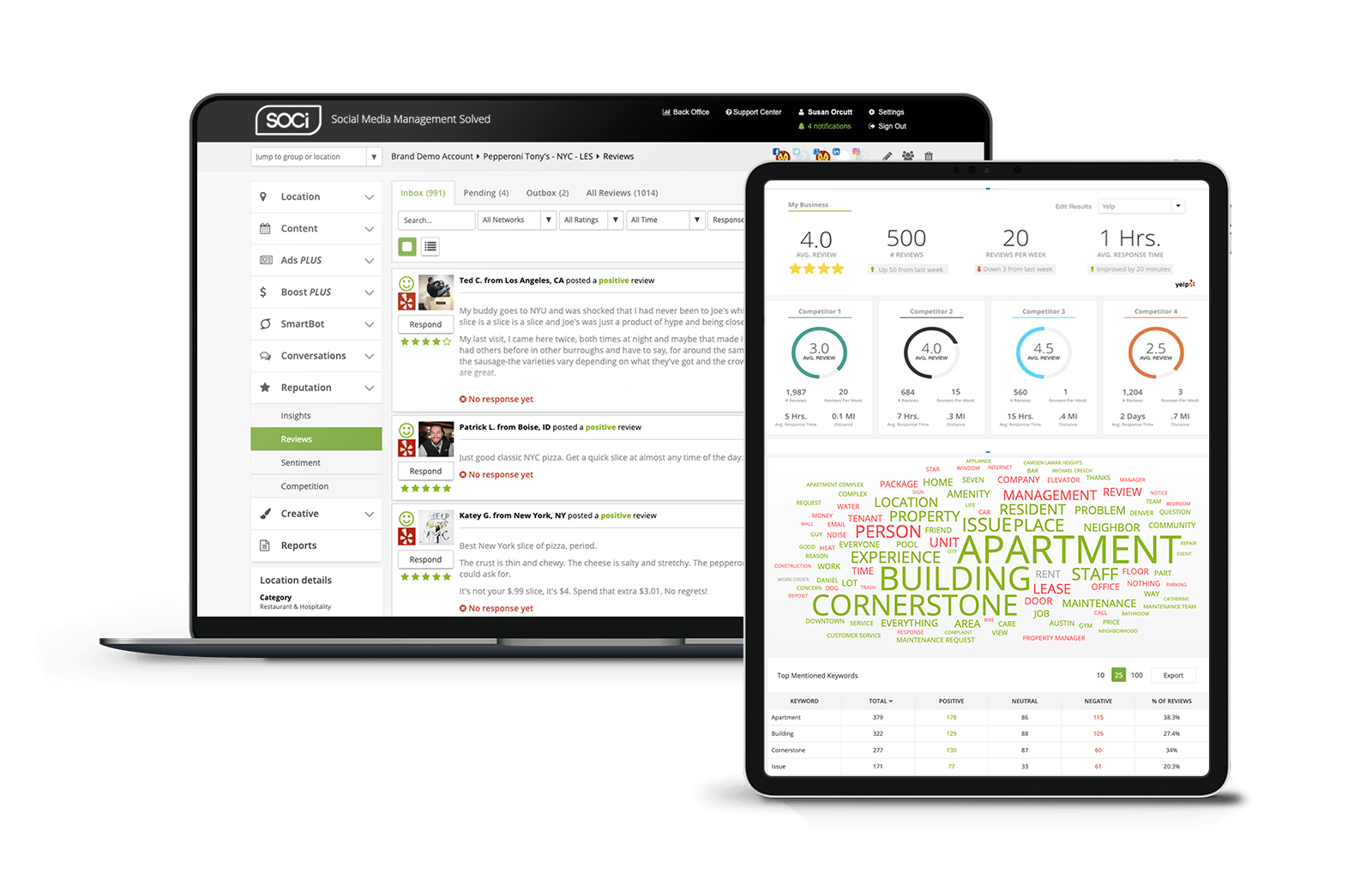
SOCi Reviews also has sentiment analysis capabilities, allowing you to identify and manage emerging reputation trends. Furthermore, our recent OpenAI integration allows customers to respond promptly to reviews in a more personalized and engaging way.
Request a demo today for more information on either of these products and how SOCi can help improve your local search rankings!






